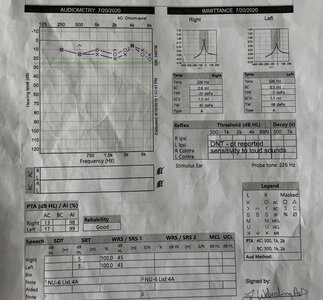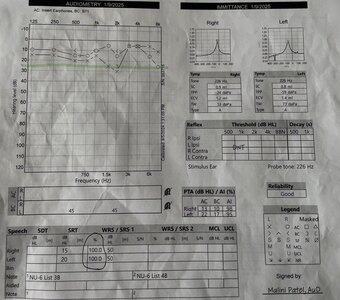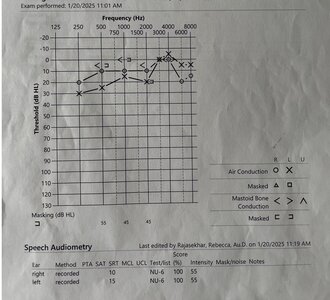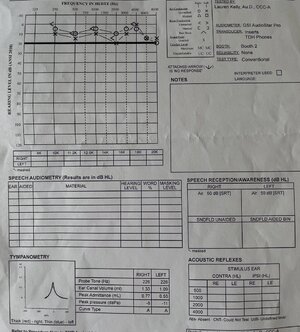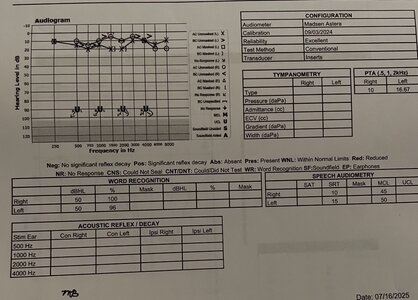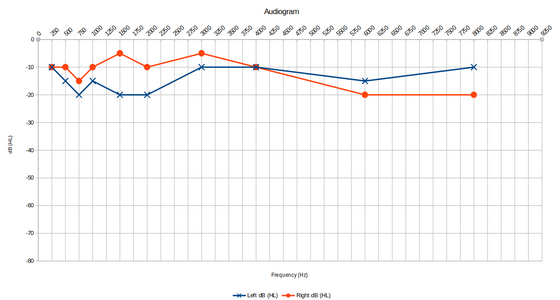In December 2024, I had an audio accident in a rental car where I was blasted with around 105 dB of audio for about six seconds. Within a couple of days, I developed the following symptoms:
After five months, my symptoms had reduced, and I was starting to feel like I had reached a new version of normal. The ear fullness had gone away, the seashell reverberation was unnoticeable, and I could again clearly understand speech in noisy environments. The most consistent issue was a lopsided hearing experience, as there was mild loss in the left ear. I still had a slightly deadened feeling in that ear, but by five months it felt like it was opening up and evening out. The hyperacusis had largely improved, and I only reacted negatively if my phone alarm was too close to my head in the morning.
After the accident, I stopped listening to music because it sounded unclear and lacked detail. The loss of stereo immersion made it completely joyless. At about four months, I began listening to music again, and by the five-month mark I felt like I had regained a pseudo-stereo sound. Just as this improvement occurred, I listened to audio at 85 dB (fluctuating between 82 and 87), which did not cause immediate pain or discomfort but sent my ears into a complete spiral of symptoms.
After this episode, I developed the following:
It has now been three months since this re-injury. Although the intense pressure has stabilized and the dizziness is no longer constant or severe, all the other symptoms have remained stable and persistent. There has been no improvement in clarity or in the distortion of sound into that shallow, old-radio quality. Sounds are still muffled and reduced. The tinnitus is constant, with occasional temporary spikes in volume. The hyperacusis is still present, as I now react to volumes that did not bother me after the first injury.
Because there has been no improvement in hearing for three months, I am beginning to feel deeply sad that I may never again hear music anywhere close to how I once knew it. I have a classical musician's mind, where detail and immersion are central to my enjoyment, and that is now gone. I honestly cannot listen to opera without my eyes filling with tears because it sounds so unpleasant. This is probably the most difficult health-related issue I have ever faced, because I have lost such a huge part of my mind and identity. Had I been born with the hearing I have now, I doubt I would have ever enjoyed music or played an instrument. Where sound used to be a source of great pleasure, it is now almost the opposite.
From my research, three possible explanations seem most probable:
Although it is less widely accepted and some ENTs do not consider it a valid diagnosis, tonic tensor tympani syndrome is believed to cause muffled hearing, hyperacusis, and ear fullness. The audiologist I am seeing for hyperacusis and tinnitus therapy supports this possibility.
An OAE test showed some hair cell loss at one frequency in both ears, though the audiologist said this was still within normal range. I will be doing a VNG test and possibly an ECOG, although I have read accounts of tinnitus worsening after ECOG. Because I have developed disorientation, I am concerned that I might end up with some form of Ménière's disease.
At this point, I feel hopeless about regaining unblocked ears and relatively normal stereo sound, as three months have passed without improvement.
If anyone has opinions on whether recovery is still possible from these symptoms, or advice on what I could do, I would greatly appreciate the feedback.
- Distorted hearing, with muffled sound and a loss of stereo immersion
- Ear pressure and fullness
- Music sounding unclear, requiring me to turn up the volume
- My voice sounding distorted and too loud
- Soft seashell-like reverberation tinnitus
- Sensitivity to loud sounds
- Difficulty understanding people in noisy public environments
- Pain radiating below the ear, especially noticeable when lying down
After five months, my symptoms had reduced, and I was starting to feel like I had reached a new version of normal. The ear fullness had gone away, the seashell reverberation was unnoticeable, and I could again clearly understand speech in noisy environments. The most consistent issue was a lopsided hearing experience, as there was mild loss in the left ear. I still had a slightly deadened feeling in that ear, but by five months it felt like it was opening up and evening out. The hyperacusis had largely improved, and I only reacted negatively if my phone alarm was too close to my head in the morning.
After the accident, I stopped listening to music because it sounded unclear and lacked detail. The loss of stereo immersion made it completely joyless. At about four months, I began listening to music again, and by the five-month mark I felt like I had regained a pseudo-stereo sound. Just as this improvement occurred, I listened to audio at 85 dB (fluctuating between 82 and 87), which did not cause immediate pain or discomfort but sent my ears into a complete spiral of symptoms.
After this episode, I developed the following:
- Both ears became plugged and full, with intense pressure
- My own voice sounded muffled and dialed down, as did general sounds
- Audio became shallow and overly treble, almost canned, with a noticeable lack of clarity, like an old radio
- My chewing sounded louder
- My ear began crackling and popping when speaking
- I developed ringing tinnitus, first in the left ear and then in both
- After a month of unrelenting fullness, I began experiencing disorientation and dizziness
It has now been three months since this re-injury. Although the intense pressure has stabilized and the dizziness is no longer constant or severe, all the other symptoms have remained stable and persistent. There has been no improvement in clarity or in the distortion of sound into that shallow, old-radio quality. Sounds are still muffled and reduced. The tinnitus is constant, with occasional temporary spikes in volume. The hyperacusis is still present, as I now react to volumes that did not bother me after the first injury.
Because there has been no improvement in hearing for three months, I am beginning to feel deeply sad that I may never again hear music anywhere close to how I once knew it. I have a classical musician's mind, where detail and immersion are central to my enjoyment, and that is now gone. I honestly cannot listen to opera without my eyes filling with tears because it sounds so unpleasant. This is probably the most difficult health-related issue I have ever faced, because I have lost such a huge part of my mind and identity. Had I been born with the hearing I have now, I doubt I would have ever enjoyed music or played an instrument. Where sound used to be a source of great pleasure, it is now almost the opposite.
From my research, three possible explanations seem most probable:
- Cochlear synaptopathy
- Endolymphatic hydrops
- Tonic tensor tympani syndrome
Although it is less widely accepted and some ENTs do not consider it a valid diagnosis, tonic tensor tympani syndrome is believed to cause muffled hearing, hyperacusis, and ear fullness. The audiologist I am seeing for hyperacusis and tinnitus therapy supports this possibility.
An OAE test showed some hair cell loss at one frequency in both ears, though the audiologist said this was still within normal range. I will be doing a VNG test and possibly an ECOG, although I have read accounts of tinnitus worsening after ECOG. Because I have developed disorientation, I am concerned that I might end up with some form of Ménière's disease.
At this point, I feel hopeless about regaining unblocked ears and relatively normal stereo sound, as three months have passed without improvement.
If anyone has opinions on whether recovery is still possible from these symptoms, or advice on what I could do, I would greatly appreciate the feedback.

